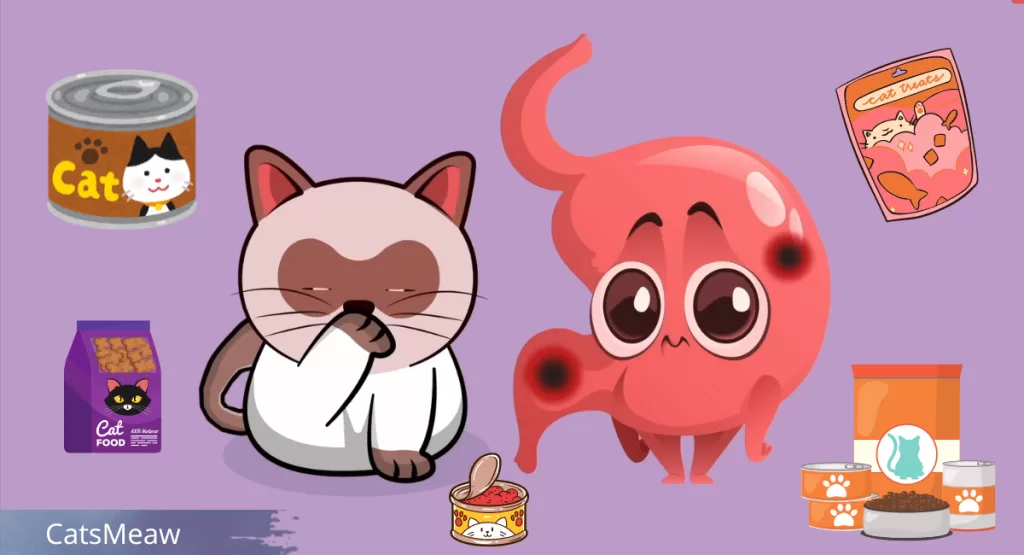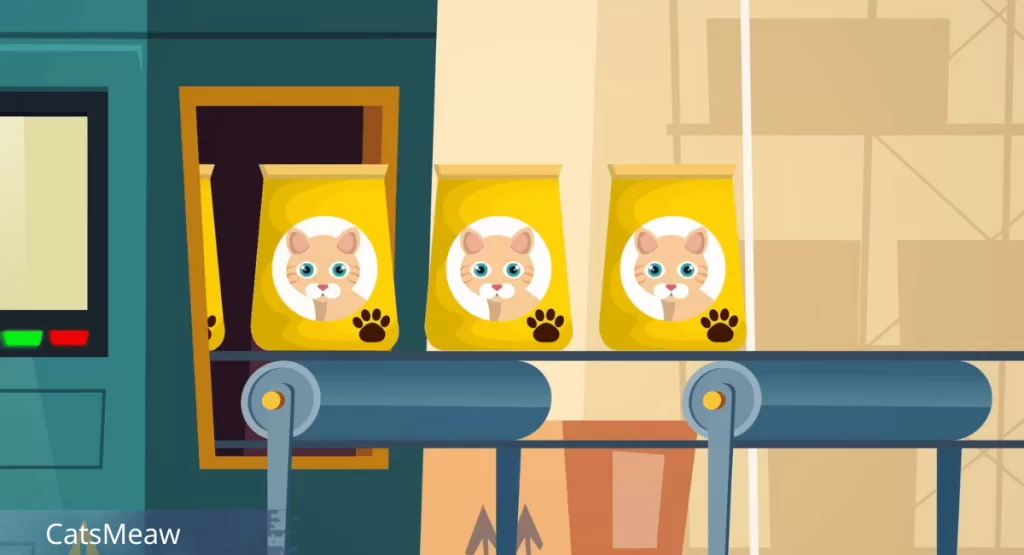Cats, like humans, can also suffer from sensitive stomachs. It is important to understand the causes and symptoms of this condition in order to provide the best care for your feline friend. The cats with sensitive stomachs may experience frequent vomiting or diarrhea, which can be distressing for both the cat and its owner. It is crucial to address this issue promptly to ensure your cat’s health and well-being.

A sensitive stomach in cats can be caused by various factors, including food allergies or intolerances, gastrointestinal infections, or even stress. Some cats may have a naturally sensitive digestive system, while others may develop sensitivity over time. It is important to observe your cat’s eating habits and behavior to determine if they have a sensitive stomach. Common symptoms include vomiting, diarrhea, excessive gas, and changes in appetite.
Table of Contents
Causes of vomiting in cats with sensitive stomachs
Vomiting is a common symptom of cats with sensitive stomachs. It is essential to identify the underlying causes to effectively manage this issue. Food allergies or intolerances are one of the leading causes of vomiting in cats. Some cats may have difficulty digesting certain ingredients, such as grains or specific proteins. It is important to eliminate these trigger ingredients from your cat’s diet to reduce vomiting episodes.
Gastrointestinal infections can also cause vomiting in cats with sensitive stomachs. Bacterial or viral infections can upset the digestive system, leading to vomiting and diarrhea. If your cat has persistent vomiting, it is advisable to consult a veterinarian to rule out any underlying infections. Stress can also contribute to vomiting in cats. Changes in the environment, such as moving to a new home or the introduction of a new pet, can cause stress and disrupt their digestive system.
Importance of selecting the right cat food for sensitive stomachs
selecting the right cat food is important for cats with sensitive stomachs. A well-balanced and easily digestible diet can help alleviate digestive issues and reduce vomiting episodes. Seek out cat foods tailored for sensitive stomachs. These foods are often made with high-quality ingredients that are gentle on the digestive system.
Avoid cat foods that contain common allergens, such as grains, artificial additives, or fillers and that maybe a dangerous food for cats. Opt for limited ingredient diets or grain-free options to minimize the risk of triggering allergies or intolerances. Additionally, consider feeding your cat smaller, more frequent meals to prevent overloading their digestive system. Providing fresh water throughout the day is also essential to keep your cat hydrated and support their overall digestive health.
Factors to consider when selecting the best cat food for sensitive stomach vomiting
When choosing the best cat food for a sensitive stomach, there are several factors to consider. First, check the ingredients list to ensure it does not contain any potential allergens or irritants. Look for easily digestible proteins, such as chicken or fish, which are less likely to cause digestive upset. Avoid foods with artificial colors, flavors, or preservatives, as these can also contribute to stomach issues.
Our pick: The Best Cat Food for Indoor Cats
Consider the texture of the cat food as well. Some cats with sensitive stomachs may prefer wet or canned food over dry kibble. Wet food offers extra hydration and may be more digestible. However, if you choose dry kibble, make sure it is formulated for sensitive stomachs and is easily chewable to prevent any discomfort.
It is also important to take your cat’s age, breed, and overall health into consideration when selecting cat food. Kittens, senior cats, and cats with specific health conditions may require specialized diets. Seek personalized recommendations from your veterinarian tailored to your cat’s individual requirements.
Best cat food brands recommended for cats with sensitive stomachs
There are several cat food brands that are highly recommended for cats with sensitive stomachs. These brands prioritize quality ingredients and formulate their products to be easily digestible and gentle on the stomach. Here are some top recommendations:
- Fancy Feast: This brand offers a wide range of cat foods specifically designed for cats with sensitive stomachs. Their formulas are free from common allergens and contain high-quality proteins and essential nutrients.
- Wellness: Known for their limited ingredient diets, this brand focuses on providing simple yet nutritious cat food options. They use high-quality proteins and avoid artificial additives that can trigger digestive issues.
- Dr Elseys: This brand offers a variety of wet and dry cat foods that are ideal for cats with sensitive stomachs. Their formulas are made with easily digestible ingredients and contain beneficial nutrients for optimal digestive health.
Remember to introduce any new cat food gradually, mixing it with your cat’s current food to avoid any sudden changes that can upset their stomach. Monitor your cat’s response to the new food, looking for any improvements or worsening of symptoms. If you notice any adverse reactions, consult with your veterinarian for further guidance.
Additional measures to manage vomiting in cats with sensitive stomachs
In addition to choosing the right cat food, there are other measures you can take to manage vomiting in cats with sensitive stomachs. First, ensure your cat’s feeding area is clean and free from any potential contaminants. Wash their food and water bowls regularly to prevent bacterial growth that can contribute to digestive issues.

Think about offering your cat smaller, more frequent meals during the day. This approach can prevent overeating and lower the risk of vomiting. Avoid feeding your cat immediately before or after physical activity, as this can also trigger digestive upset.
If stress is a contributing factor to your cat’s sensitive stomach and vomiting, try to create a calm and stable environment for them. Provide hiding spots, comfortable resting areas, and engage in interactive play to reduce stress levels. If necessary, consult with a veterinarian or animal behaviorist for additional guidance on managing stress in cats.
Providing the best nutrition for your cat’s sensitive stomach
Cats with sensitive stomachs require special care and attention when it comes to their nutrition. By understanding the causes and symptoms of sensitive stomachs, you can make informed decisions to manage vomiting and improve your cat’s overall well-being.
Choosing the right cat food is crucial in providing the best nutrition for your cat’s sensitive stomach. Look for high-quality ingredients, avoid common allergens, and consider the texture of the food. Additionally, take into account your cat’s age, breed, and overall health when selecting cat food.
Remember to introduce any new food gradually and monitor your cat’s response. If vomiting persists or worsens, consult with your veterinarian for further evaluation and guidance. With the right diet and additional measures, you can help your cat lead a happy and healthy life, free from digestive issues

